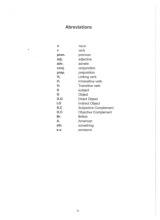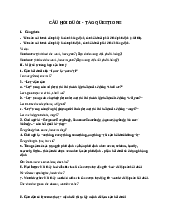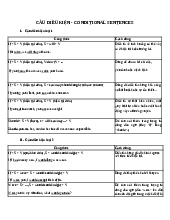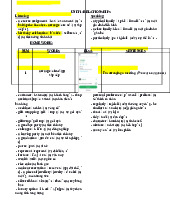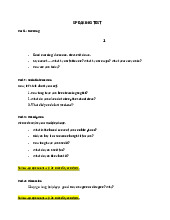



















Preview text:
lOMoAR cPSD| 58507440
Bài tập về các thì trong Tiếng Anh
Lý thuyết các thì trong tiếng Anh 1. Present Simple tense.( Thì hiện tại đơn)
- Use : là một thì trong ngữ pháp tiếng Anh nói chung. Thì hiện tại đơn diễn tả một
hành động hay sự việc mang tính chất chung chung, tổng quát lặp đi lặp lại nhiều lần
hoặc một sự thật hiển nhiên hay một hành động diễn ra trong thời gian ở hiện tại.
+ Diển tả một chân lý, một sự thật hiển nhiên (1 hiện tượng vật lý). - Form:
+ S + V/Vs / es + ……………………. Ex: -The earth goes around the sun.
- S + don’t/doesn’t + V+ ……………….. -We don’t have classes on Sunday.
? Do/Does + S + V + ………………….? - Does Lan speak French?
- Các từ nhận biết: always, usually, often, sometimes, seldom, never, every day/ week/month/ year…
- Lưu ý: ta thêm “ES” sau các động từ tận cùng bằng: O, S, X, CH, SH ( goes, misses, fixes, watches, washes
* Động từ/ danh từ tận cùng bằng -S có 2 cách phát âm là: /s, /z/. a.
Đối với những động từ/ danh từ tận cùng là: -p, -f, -th, -k, -t khi thêm -S sẽ phát âm là /s/.
Ex: stops, books, cuts, months, roofs,....... b.
Đối với những động từ/ danh từ tận cùng là các phụ âm còn lại hoặc nguyên
âm, khithêm -S sẽ phát âm là /z/.
Ex: enjoys, stays, dogs, pens, tables, lives,.......
2. Past Simple Tense (Thì quá khứ đơn)
- Use : diễn tả hành động bắt đầu và kết thúc trong quá khứ và không còn liên quan tớihiện tại. lOMoAR cPSD| 58507440
Thì quá khứ đơn có thể sử dụng với trạng từ thời gian xảy ra trong quá khứ (ví dụ: I
walked to the market last Saturday) hoặc tại một thời điểm xác đinh (ví dụ: I studied today). - Form:
+ S + V-ed(hợp quy tắt ) / V2 (bất quy tắt ) + ……. Ex : - He arrived here yesterday.
- S + didn’t + V + …………………. - She didn’t go to school yesterday.
? Did + S + V + …………………… ? - Did you clean this table?
- Các từ nhận biết : last week / month / year . . ., ago, yesterday, In + name trong quá khứ, from 2000 to 2005.
3. Past perfect Tense (Thì quá khứ hoàn thành):
- Use: Diễn tả 1 hành động quá khứ xảy ra trước 1 mốc thời gian hoặc một sự kiện trong quá khứ. - Form: + S + Had + V3 + O.
- S + Hadn’t + V3 + O. ? Had + S + V3 + O ?
Ex: We had lived in Hue before 1975.
- We hadn’t lived in Hue before 1975. - Had they lived in Hue before 1975 ?
4. Future simple Tense ( Thì tương lai đơn)
- Use : được dùng khi không có kế hoạch hay quyết định làm gì nào trước khi chúng
ta nói. Chúng ta ra quyết định tự phát tại thời điểm nói. Thường sử dụng thì tương lai
đơn với động từ "to think "trước nó. - Form :
+ S + will / shall + V ……… Ex: He will finish his homework tomorrow .
- S+ won’t / shan’t + V + ………. Lan won’t go to the zoo next week.
? Will / Shall + S + V + …………? Will you do this exercise ?
- Các từ nhận biết: someday, next, tomorrow, soon … lOMoAR cPSD| 58507440
5. Present progressive Tense (Thì hiện tại tiếp diễn)
- Use : + là một thì trong tiếng Anh hiện đại. Nó dùng để diễn tả những sự việc xảy ra
ngay lúc chúng ta nói hay xung quanh thời điểm nói, và hành động chưa chấm dứt
(còn tiếp tục diễn ra).
Ex: He is learning English now.
+ Thường dùng tiếp theo câu đề nghị, mệnh lệnh và cảnh báo (nhận biết bằng dấu “ !”)
Ex: Look ! The child is crying.
+ Diễn tả một hành động chắc chắn sẽ xảy ra trong tương lai, đã được lên kế hoạch.
Ex: We are going to the movie theater tonight.
-Form : + S + is / am/ are + V-ing + …………… Ex : I’m learning English now.
- S + is / am/ are + not + V-ing + …… He isn’t learning English now.
? Is / Am / Are + S + V-ing + ………? Is he reading books now?
-Lưu ý: Không dùng thì hiện tại tiếp diễn với các động từ chỉ nhận thức tri giác như:
tobe, see, hear, taste, understand, know, like, want, glance, feel, think, love, hate,
realize, seem, remember, forget,…
6. Past progressive Tense (Thì quá khứ tiếp diễn )
- Use: + Diễn tả một hành động xảy ra và kéo dài trong quá khứ.
Ex: I was playing football from 4 p.m to 6 p.m yesterday afternoon.
+ Diễn tả 1 hành động đang xảy ra 1 thời điểm trong quá khứ.
Ex: He was sleeping at that time.
+ Diễn tả hai hành động xảy ra cùng 1 lúc trong quá khứ.
Ex: Yesterday, I was cooking while my sister was washing dishes. - Form:
+ S + Was/ were +V-ing .....+ O lOMoAR cPSD| 58507440
- S + Was/ were + not +V-ing +O …? Was/were + S +V-ing
+O …. ? - He was sleeping at that time.
- He wasn’t sleeping at that time-Was he sleeping at that time.
7. Mixed Tense ( Sự kết hợp giữa các thì ):
- Hai hành động cùng xảy ra trong quá khứ, hành động nào kéo dài hơn thì dùng Quá
Khứ Tiếp Diễn, hành động nào ngắn hơn thì dùng Quá Khứ Đơn.
Ex: Last night, when I was sleeping, the phone rang.
- Hai hành động cùng xảy ra trong quá khứ, hành động nào xảy ra trước thì dùng Quá
khứ Hoàn Thành, hành động nào xảy ra sau thì dùng Quá Khứ Đơn (After, before )
Ex: After the children had finished their homeworked, they went to bed.
- Những hành động xảy ra liên tiếp nhau trong quá khứ thì dùng Quá Khứ Đơn.
Ex: Last night, when I was sleeping, I heard the sound in the kitchen. I woke up and
went to downstair. I turned off lights. Suddenly, I was unconscious by a hit.
8. The passive form (voice) BE + V3 /V-ed (past participle)
Ex: They design cars all over the world.
V 3 ( Quá khứ Thì Chủ ngữ Trợ từ phân từ)
1 . Present simple The car/cars Is/ are designed ( HTĐ ) . Pr 2 esent Have/ has been The car/cars designed perfect(HTHT)
3 . Past simple(QKĐ ) The car/cars Was/ were designed . Past 4 had been The car/cars designed perfect(QKHT) lOMoAR cPSD| 58507440 Will/ can/ should/
5 .Future(TLĐ) và must/ may/ might + Động từ khiếm The car/cars be designed quyết.
6 . Future Perfect will have been The car/cars designed ( TLHT ) 7 . Present
The car/cars Is/ are being designed progressive( HTTD)
8 . Past progressive. The car/cars Was/ were being designed ( QKTD )
9. Modal verbs (động từ khiếm quyết)
Động từ khiếm quyết bao gồm: must, mustn’t, needn’t, shouldn’t, should, ought to,
can , can’t, could, may, might -Form :
+ S + modal verb + V + ………. Ex : I can sing very well.
- S + modal verb + not + V + ………
Ex : Hoa may not come to the party tomorrow.
? Modal verb + S + V + ………….? Ex : May I come in ?
Xem thêm: Tổng hợp kiến thức về 12 thì trong tiếng Anh
10. Thì hiện tại hoàn thành tiếp diễn – Present Perfect Continuous a. Khái niệm
Thì hiện tại hoàn thành tiếp diễn (Present perfect continuous tense) là thì diễn tả sự
việc bắt đầu trong quá khứ và tiếp tục ở hiện tại có thể tiếp diễn ở tương lai sự việc đã
kết thúc nhưng ảnh hưởng kết quả còn lưu lại hiện tại.
b. Công thức thì hiện tại hoàn thành tiếp diễn
• Khẳng định: S + have/has + been + V_ing
Ex: She has been running all day. (Cô ấy đã chạy liên tục cả ngày) lOMoAR cPSD| 58507440
• Phủ định: S + have/has + not + been + V_ing
Ex: She has not been running all day. (Cô ấy không chạy liên tục cả ngày)
Nghi vấn: Has/ Have + S + been+ V_ing?
Ex: Has she been running all day? (Có phải cô ấy đã chạy liên tục cả ngày? )
c. Cách dùng thì hiện tại hoàn thành tiếp diễn
Dùng để nhấn mạnh tính liên tục của một sự việc bắt đầu từ quá khứ và tiếp diễn đến hiện tại.
Ex: She has been learning English for 6 years. (Cô ấy đã học tiếng Anh được 6 năm)
Diễn tả hành động vừa kết thúc với mục đích nêu lên tác dụng và kết quả của hành động ấy.
Ex: I am exhausted because I have been working all day. (Tôi kiệt sức bởi vì tôi đã làm việc cả ngày)
d. Dấu hiệu nhận biết thì hiện tại hoàn thành tiếp diễn
Các từ để nhận biết:
• All day, all week, all month: cả ngày/ tuần/tháng • Since, for
11. Thì quá khứ đơn– Simple Past a. Khái niệm
Thì quá khứ đơn (Past simple tense) dùng để diễn tả một hành động, sự việc diễn ra và kết thúc trong quá khứ.
b. Công thức thì quá khứ đơn Loại
Đối với động từ thường
Đối với động từ “to be” câu lOMoAR cPSD| 58507440 Khẳng S + V2/ed + O S + was/were + O định Phủ S + didn’t + V_inf + O S + was/were + not + O định Nghi Did + S + V_inf + O? Was/were + S + O? vấn I saw Peter yesterday.
( Ngày hôm qua tôi đã nhìn thấy
I was tired yesterday. (Ngày Peter)
hôm qua tôi đã rất mệt) I didn’t go to school The supermarket was not full yesterday. Ví Dụ
yesterday. (Ngày hôm qua, siêu thị không đông)
( Ngày hôm qua tôi đã không đi học) Were you absent yesterday?
- Did you visit Mary last week?
( Hôm qua bạn vắng phải không?
( Tuần trước bạn đến thăm Mary phải không ?)
Xem thêm: Tổng hợp kiến thức về 12 thì trong tiếng Anh
Bài tập về các thì trong tiếng Anh
Exercise 1: Use the correct form of verbs in brackets.
1. In all the world, there (be) __________ only 14 mountains that (reach) __________above 8,000 meters.
2. He sometimes (come) __________ to see his parents.
3. When I (come) __________, she (leave) __________for Dalat ten minutes ago.
4. My grandfather never (fly) __________ in an airplane, and he has no intention of ever doing so.
5. We just (decide) __________ that we (undertake) ____________ the job. lOMoAR cPSD| 58507440
6. He told me that he (take) __________ a trip to California the following week.
7. I knew that this road (be) __________ too narrow.
8. Right now I (attend) __________ class. Yesterday at this time I (attend) __________class.
9. Tomorrow I'm going to leave for home. When I (arrive) __________at the airport,
Mary (wait) __________ for me.
10. Margaret was born in 1950. By last year, she (live) __________on this earth for 55 years .
11. The traffic was very heavy. By the time I (get) __________to Mary's party,
everyone already (arrive) __________
12. I will graduate in June. I (see) __________ you in July. By the time I (see)
__________ you , I (graduate) __________.
13. I (visit) __________ my uncle's home regularly when I (be) __________ a child.
14. That book (be) __________ on the table for weeks. You (not read) __________ it yet ?
15. David (wash) __________ his hands. He just (repair) __________ the TV set.
16. You (be) __________here before? Yes, I (spend) __________ my holidays here last year.
17. We never (meet) __________ him. We don't know what he (look) __________ like.
18. The car (be) __________ ready for him by the time he (come) __________tomorrow.
19. On arriving at home I (find) __________that she just (leave) __________a few minutes before. lOMoAR cPSD| 58507440
20. When we (arrive) __________ in London tonight, it probably (rain) __________.
21. It (rain) __________ hard. We can't do anything until it (stop) __________
22. Last night we (watch) __________TV when the power (fail) __________.
23. That evening we (stay) __________up to talk about the town where he (live) __________for some years.
24. I (sit) __________down for a rest while the shoes (repair) __________.
25. Half way to the office Paul (turn) __________round and (go) __________back
home because he (forget) __________to turn the gas off.
26. London (change) __________a lot since we first (come) __________ to live here.
27. While we (talk) __________on the phone the children (start) __________fighting
and (break) __________a window
28. He used to talk to us for hours about all the interesting things he (do) __________ in his life.
29. You know she (stand) __________looking at that picture for the last twenty minutes.
30. I (spend) __________ a lot of time travelling since I (get) __________this new job.
31. When we (be) __________ at school we all (study) __________Latin.
32. When I (meet) __________ him , he (work) __________as a waiter for a year.
33. After he (finish) __________ breakfast he (sit) __________down to write some letters.
34. She (have) __________a hard life, but she's always smiling.
35. I think Jim (be) __________ out of town. lOMoAR cPSD| 58507440
Exercise 2: Choose the best answer among A, B, C, or D.
1. When I last saw him, he _____ in London. A. has lived B. is living C. was living D. has been living
2. We _______ Dorothy since last Saturday. A. don’t see B. haven’t seen C. didn’t see D. hadn’t seen
3. The train ______ half an hour ago. A. has been leaving B. left C. has left D. had left 4. Jack ______ the door. A. has just painted B. paint C. will have painted lOMoAR cPSD| 58507440 D. painting
5. My sister ________ for you since yesterday. A. is looking B. was looking C. has been looking D. looked
6. I ______ Texas State University now. A. am attending B. attend C. was attending D. attended
7. He has been selling motorbikes ________. A. ten years ago B. since ten years C. for ten years ago D. for ten years
8. Christopher Columbus _______ American more than 500 years ago. A. discovered B. has discovered C. had discovered lOMoAR cPSD| 58507440 D. had been discovering
9. He fell down when he ______ towards the church. A. run B. runs C. was running D. had run
10. We _______ there when our father died. A. still lived B. lived still C. was still lived D. was still living
11. They ______ table tennis when their father comes back home. A. will play B. will be playing C. play D. would play
12. By Christmas, I _______ for Mr. Smith for six years. A. will have been working B. will work C. have been working lOMoAR cPSD| 58507440 D. will be working
13. I _______ in the room right now A. am being B. was being C. have been being D. am
14. I ______ to New York three times this year. A. have been B. was C. were D. had been
15. I’ll come and see you before I _______ for the States. A. leave B. will leave C. have left D. shall leave
16. The little girl asked what _______ to her friend. A. has happened B. happened C. had happened lOMoAR cPSD| 58507440 D. would have been happened
17. John ______ a book when I saw him. A. is reading B. read C. was reading D. reading
18. He said he _______ return later. A. will B. would C. can D. would be 19. Jack ________ the door. A. has just opened B. open C. have opened D. opening
20. I have been waiting for you ______ . A. since early morning B. since 9 a.m C. for two hours lOMoAR cPSD| 58507440 D. All are correct
21. Almost everyone _______ for home by the time we arrived. A. leave B. left C. leaves D. had left
22. By the age of 25, he ______ two famous novels. A. wrote B. writes C. has written D. had written
23. When her husband was in the army, Mary ______ to him twice a week A. was reading B. wrote C. was written D. had written
24. I couldn’t cut the grass because the lawn mower ______ a few days previously. A. broke down B. has been broken C. had broken down lOMoAR cPSD| 58507440 D. breaks down
25. I have never played badminton before. This is the first time I _____ to play. A. try B. tried C. have tried D. am trying
26. Since _______, I have heard nothing from him. A. he had left B. he left C. he has left D. he was left
27. After I _______ lunch, I looked for my bag. A. had B. had had C. have has D. have had
28. By the end of next year, George _______ English for two years. A. will have learned B. will learn C. has learned lOMoAR cPSD| 58507440 D. would learn
29. The man got out of the car, ________ round to the back and opened the book. A. walking B. walked C. walks D. walk
30. Henry _______ into the restaurant when the writer was having dinner. A. was going B. went C. has gone D. did go
31. He will take the dog out for a walk as soon as he ______ dinner. A. finish B. finishes C. will finish D. finishing
32. I will be glad if he _______ with us. A. had gone B. did go C. went lOMoAR cPSD| 58507440 D. goes
33 Ask her to come and see me when she _______ her work. A. finish B. has finished C. finished D. finishing
34. Turn off the gas. Don’t you see that the kettle ________ ? A. boil B. boils C. is boiling D. boiled
35. Tom and Mary ______ for Vietnam tomorrow. A. leave B. are leaving C. leaving D. are left
36. He always ________ for a walk in the evening. A. go B. is going C. goes lOMoAR cPSD| 58507440 D. going
37. Her brother ______ in Canada at present. A. working B. works C. is working D. work
38. I ______ to the same barber since last year. A. am going B. have been going C. go D. had gone
39. Her father ______ when she was a small girl. A. dies B. died C. has died D. had died
40. Last week, my professor promised that he ________ today. A. would come B. will come C. comes lOMoAR cPSD| 58507440 D. coming
Exercise 3: Choose the underlined part in each sentence (A, B,C, or D ) that needs correcting
1. After Mrs. Wang had returned (A)to her house (B)from work (C), she was cooking (D) dinner.
2. Jimmy threw (A)the ball high (B)in the air, and Betty catching (C) it when (D) it came down.
3. Linda has worn (A)her new yellow (B)dress only once (C) since she buys (D) it.
4. Last week Mark told (A)me that he go (B)tvery bored with his present job and is
looking (C) for a new on (D)e.
5. Having (A)fed the dog, he was sat (B)down to (C) his own (D) meal.
6. When I turned on my computer, I was shocked (A)to find (B)some junk mail, and (C) I delete (D) it all.
7. They are going to have to (A)leave soon (B)and so do (C) we (D).
8. The boss laughed when the secretary has told (A)him that she really (B)needed (C) a pay (D) rise.
9. The telephone rang several times (A)and then (B)stop (C) before I could (D) answer it.
10. Debbie, whose father (A)is an excellent tennis player(B), has been (C) playing tennis since (D)ten years.
11. I have seen (A)lots(B)of interesting (C) places when I went (D) on holiday last summer.
12. When my cat heard (A)a noise in the bushes, she stopped moving (B)and listen (C) intently (D).
